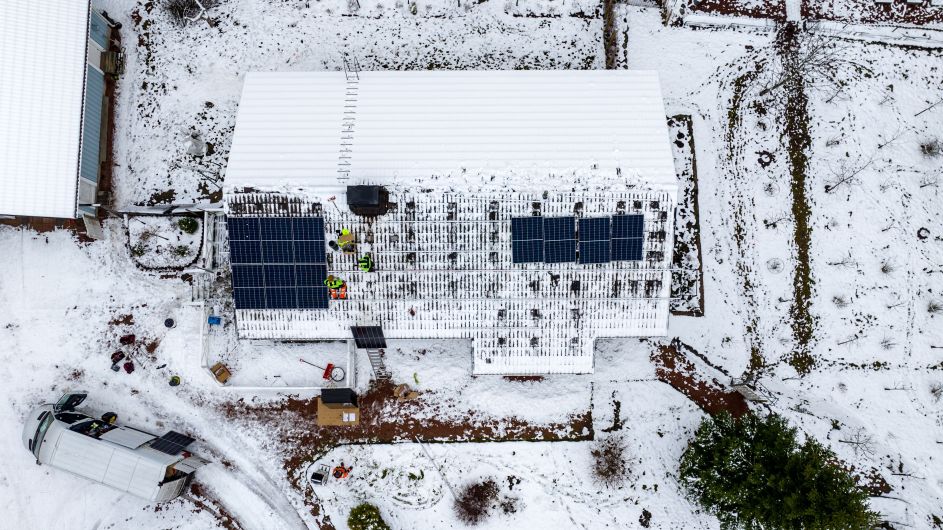If you’re a Massachusetts homeowner thinking about solar, winter might be your biggest hesitation. You’ve seen snowy rooftops, shorter daylight hours, and wonder: will my panels just sit useless under the snow? The truth is, solar does work in winter – and in some cases, performs even better in cold weather. At EcoSunWorks, we help local homeowners understand exactly how winter affects their solar investment and how to plan for year-round savings without stress.

Do Solar Panels Actually Work in Winter?
Yes – solar panels absolutely work in winter. In fact, they don’t need hot weather to function. What matters most is sunlight, not heat. Panels can even be more efficient in cold temperatures because cooler conditions improve voltage output.
The main factors that affect solar performance in a Massachusetts winter include:
- Less direct sunlight – the sun sits lower in the sky and days are shorter.
- Snow cover – heavy snow can block light until it slides off or is brushed away.
- Cloud cover – overcast skies reduce production, but panels still generate power from diffused light.
How Efficient Are Solar Panels in Winter?
Efficiency does dip in winter – but not as much as many people assume. A well-designed Massachusetts solar system is built with year-round production in mind.
- Colder temps boost panel performance: Silicon solar cells actually generate more electricity per photon when it’s cold.
- Snow reflection can help: The albedo effect (sunlight bouncing off bright snow) sometimes increases output.
- Net metering balances the load: Extra credits earned from summer overproduction typically offset the lower winter months on your bill.
Curious about your home’s potential? Use solar cost savings calculator to see year-round estimates.
Do Solar Panels Work If Covered by Snow?
Not until the snow slides off or is removed. A light dusting usually melts quickly, but thick, heavy snow can block energy production for hours or days.
The good news? Massachusetts solar systems are installed at angles that encourage snow to slide off naturally. Panels also absorb heat from the sun, which speeds up melting compared to your roof.
Tips to Maximize Winter Solar Output
Keeping your panels working through the cold season is about maintenance and smart planning:
- Clear panels safely – use a long-handled, soft-bristled brush (never metal scrapers or power washers).
- Angle advantage – panels installed at steeper pitches shed snow more quickly.
- Track energy credits – keep an eye on your net metering balance to ensure summer overproduction covers winter dips.
- Regular checks – schedule a quick winter inspection to make sure panels and wiring are free of ice damage.
Can Solar Panels Work Without Direct Sunlight?
Yes. Even on cloudy winter days, solar panels capture diffused sunlight. Output may drop to 10–25% of full capacity, but energy is still being generated.
Massachusetts homeowners typically see a seasonal dip in production, but annualized data shows strong ROI because high summer output balances winter.
What Temperature Is Too Cold for Solar Panels?
There’s virtually no “too cold.” Panels have been proven to work in subzero conditions in places like Canada and Scandinavia. For Massachusetts winters, freezing temps actually improve panel voltage – the only real concern is snow accumulation, not cold itself.
Bottom Line: Do Solar Panels Make Sense in Massachusetts Winters?
Absolutely. While production dips in December and January, the combination of cold-weather efficiency, snow reflection, and summer credit rollover ensures Massachusetts homeowners still see excellent year-round results.
At EcoSunWorks, we design systems that account for New England winters from the start. That means no nasty surprises when the snow hits – just steady savings all year long.
Ready to see how solar works on your home? Request a free quote today and we’ll connect you with trusted local installers in Massachusetts. Call now 8177692394
